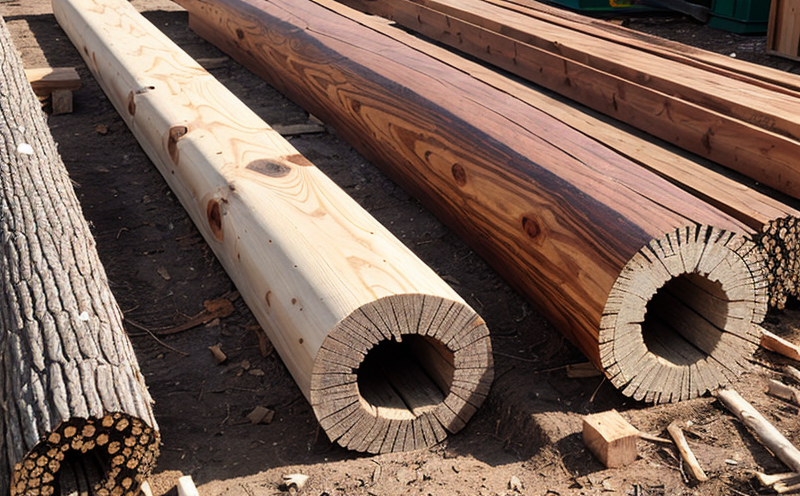Treated Wood Modulus of Elasticity Testing
The modulus of elasticity (also known as Young's modulus) is a fundamental property that measures a material’s stiffness in response to stress. In the context of treated wood, this measurement provides critical information about the structural integrity and durability under various environmental conditions. This service assesses how well treated wood resists deformation when subjected to mechanical stress.
Testing treated wood for modulus of elasticity is particularly important in agricultural and forestry sectors where timber plays a significant role in construction, infrastructure development, and sustainable resource management. Understanding the modulus helps ensure that materials meet performance requirements under expected conditions, such as exposure to moisture or extreme temperatures.
The testing process involves several key steps: selecting appropriate specimens, applying standardized mechanical loads, measuring deformation, and calculating the modulus from these data points. Specimens are typically cut from treated wood samples following industry standards like ISO 14685-2 for structural timber products. This allows for consistent comparisons across different batches or suppliers.
Instrumentation used in this testing includes universal testing machines (UTMs) capable of precise load application and displacement measurement. These systems often come equipped with environmental chambers to simulate real-world exposure conditions, which can influence the modulus values measured during testing.
A critical aspect of treating wood involves impregnating it with preservatives or other protective agents designed to extend its lifespan in outdoor applications like poles, fences, and decking. However, these treatments also affect the mechanical properties of the wood, potentially reducing flexibility and increasing stiffness compared to untreated samples. Measuring the modulus provides insights into whether such changes are beneficial for specific uses.
Acceptance criteria vary depending on the intended application of the treated wood. For instance, higher modulus values might be preferred in structural components subjected to heavy loads but could compromise flexibility needed for applications requiring resilience against wind or other dynamic forces. Compliance with relevant international standards such as ASTM D1923-14 ensures consistency and reliability of results.
In summary, treated wood modulus of elasticity testing offers valuable data regarding the material’s behavior under stress conditions, guiding decisions about appropriate treatments and applications in diverse industries including agriculture and forestry.
Eurolab Advantages
- Expertise & Experience: Eurolab boasts a team of seasoned professionals with deep expertise in wood science, material testing, and quality assurance. Our personnel have extensive experience in conducting modulus tests on treated wood according to international standards.
- State-of-the-Art Facilities: We operate cutting-edge laboratories equipped with advanced UTM systems capable of precise load application and displacement measurement under controlled environmental conditions.
- Comprehensive Reporting: Beyond mere test results, Eurolab provides detailed reports that interpret findings in the context of industry best practices. This helps clients make informed decisions about product development or quality control measures.
- Custom Solutions: Tailored testing protocols can be developed for unique project requirements ensuring accurate assessments even when standard methods do not fully capture specific needs.
Customer Impact and Satisfaction
By leveraging Eurolab’s treated wood modulus of elasticity testing services, customers gain a competitive edge by ensuring their products meet or exceed stringent quality standards. This not only enhances brand reputation but also fosters trust among end-users who value durability and longevity.
Our rigorous testing processes help identify potential issues early in the production cycle allowing for corrective actions to be implemented promptly. This proactive approach minimizes costs associated with rework or product failures later down the line, thereby contributing significantly to overall operational efficiency.
Moreover, compliance with recognized international standards like ISO 14685-2 adds credibility and opens up new market opportunities by meeting regulatory requirements in various countries. For research and development teams within our customer base, these tests serve as valuable inputs for ongoing innovation projects aimed at developing next-generation wood products.
Customer satisfaction is paramount at Eurolab. Our commitment to excellence has earned us a strong reputation among industry leaders who consistently recommend our services to their peers. Regular feedback from satisfied clients reinforces our dedication to providing top-notch testing solutions that drive business success.
Environmental and Sustainability Contributions
- Material Efficiency: By optimizing wood treatment processes through accurate modulus measurements, manufacturers can reduce waste by selecting appropriate treatments for each application type. This promotes sustainable forestry practices since less raw material is needed to achieve desired outcomes.
- Energy Savings: Understanding the mechanical properties of treated wood allows for better design choices that minimize energy consumption during construction and operation phases. For example, choosing lighter yet strong materials reduces the load on support structures, leading to lower heating or cooling demands.
- Resource Conservation: Properly treating wood extends its useful life significantly which translates into reduced demand for new raw materials over time. This aligns with broader efforts towards circular economy principles by maximizing value extraction from existing resources.





